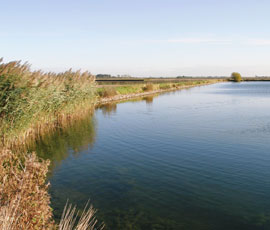Call for tax break for farm reservoirs

The NFU has repeated its call for tax incentives to encourage the construction of on-farm reservoirs.
It follows suggestions that higher water charges would encourage farmers to use water more efficiently – especially when it comes to irrigating crops.
Without action, there could be a significant shortfall of water for farming by the 2020s, warns a report by the Committee on Climate Change.
“Having a price for water that better reflects scarcity will provide a stronger incentive for action,” says the document.
“At present, there is no relationship between water availability and the cost of water to farmers at the regional level.”
The price of water should reflect its scarcity, thereby signalling the value of water to abstractors, says the document.
Higher water prices would make reservoirs more economically viable. Their construction was already justified in many areas, it adds.
NFU water resources specialist Paul Hammett said he doubted higher water charges would encourage farmers to build more reservoirs.
“Some farmers may be prepared to pay more for a guaranteed supply of water, but I am not convinced a higher water price will drive more reservoir construction,” he told Farmers Weekly.
“Farmers will be driven by water scarcity – building more reservoirs because of a desire to build more resilience into their business plans rather than by what the cost of water might be.”
Mr Hammett said it would be better to incentivise farmers to invest in reservoirs – ideally through tax measures such as capital allowances.
The climate change study compares the cost of building and maintaining reservoirs with the benefits of avoiding damage from over-abstraction from rivers in the summer.
Reservoirs were found to be justified on economic grounds where the value of the water stored was greater than £0.23/m³.
At present, the value of water is estimated to be between £0.23/m³ in northern England to well over £1.50/m³ in eastern England.
“As such, reservoirs are likely to be cost-beneficial in many locations,” says the report.
But it warns that the estimates are limited because they do not include an estimate of the value of water to the natural environment, and are therefore likely to be conservative.
“Reservoirs become more economically viable as the value of water increases, which is likely to be the result of climate change due to an increased risk of water scarcity.”
Farm leaders have long called on the government to make it easier for farmers to build reservoirs.
The NFU wants measures included in a Water Bill, due to be published by the government later this year.
